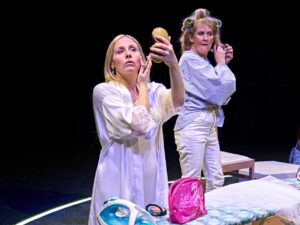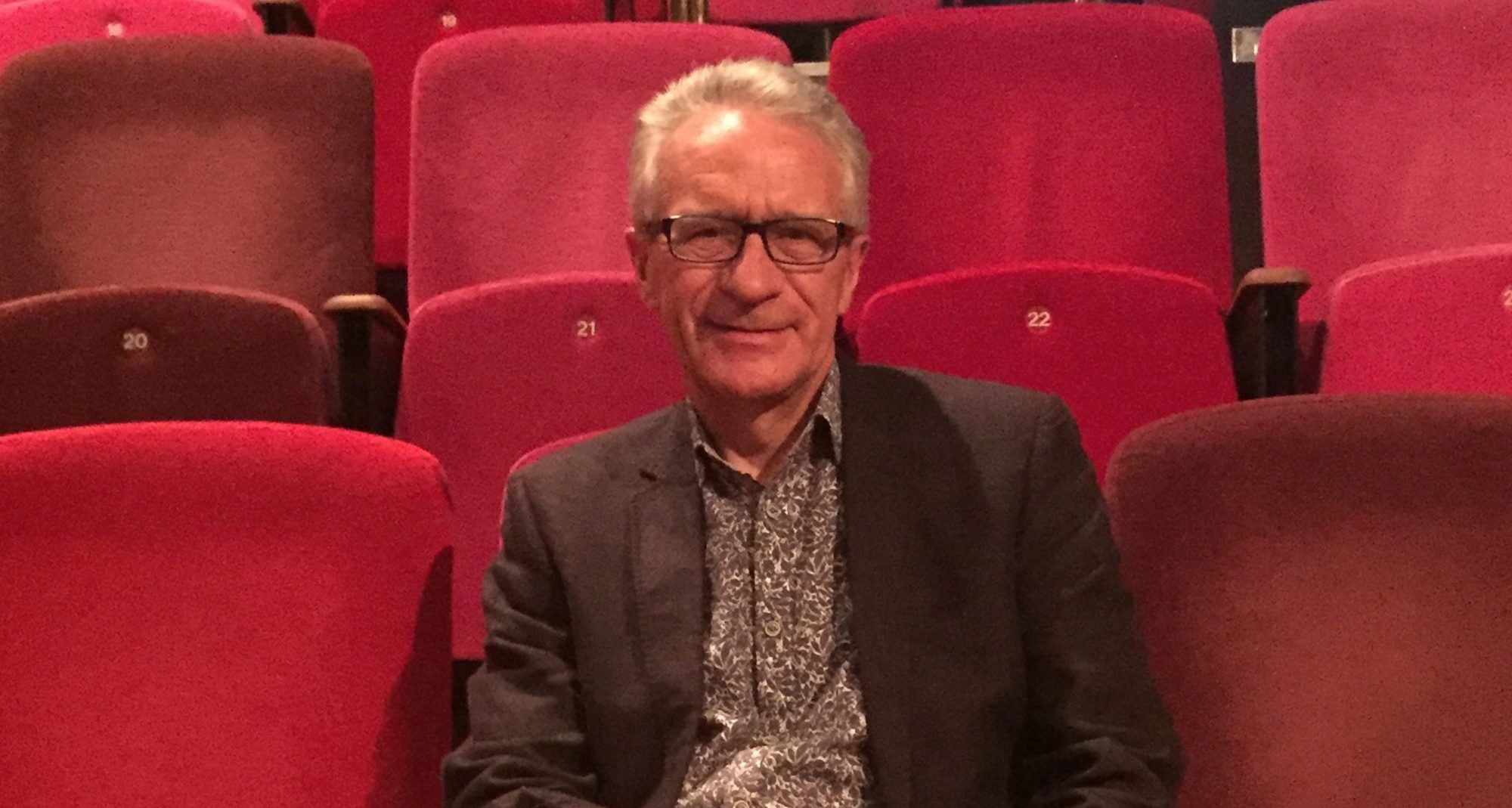Hilarious comedy reveals home truths about Britain
★★★★

Till The Stars Come Down written by Beth Steel is a shocking insight into the despair of post industrial Britain disguised as a hilarious comedy about a working class family wedding. It may also turn out to be the best new play of 2024.
At the heart of Till The Stars Come Down are three sisters. We meet these delightful characters in the excitement of the morning when the youngest Sylvia is getting married. You positively glow in the warmth of this ebullient, raucous occasion of bickering and bonding.
Hazel played by Lucy Black is the eldest, the mother hen in the absence of their late actual mother. Overworked and over cheerful, she is also begrudging and bigoted. Lisa McGrillis plays Maggie, glittery and wild but unsettled. Sinéad Matthews as Sylvia, naturally nervous but the most forward-looking of the siblings.
They are joined by Aunty Carol. She’s a force of nature who deals with life in sarcastic quips that are funny enough to have the audience in stitches. Her hard mouth shoots out words like a nail gun. From her opening line, directed at Sylvia, ‘How you doing, sugar tits?’, Lorraine Ashbourne‘s larger-than-life portrayal commands the stage in every one of her scenes.
In the beginning, all is lighthearted conversation and affectionate jibes. The women’s banter- especially Aunty Carol’s- is full of outrageous metaphors and vulgar observations: she talks of a woman who shaved pubic hair as a ‘trailblazer with a razor’. An unfaithful man would have ‘shagged a frog if he could gerrit to hold still long enough’. Maggie liked the way a man looked at her, making her feel ‘like I was a potato in a famine’. Hazel can’t wear a fascinator because she’s ‘got a flat head’.
We also meet Helen’s children. Leanne played by Ruby Stokes is a teenager who wants to save the planet while being depressed by the possibility it is beyond saving. Sarah is a confident little girl who dreams of being an astronaut.

It’s an intimate setting that keeps us involved with Beth Steel’s complex family. The audience is on all four sides looking at a stage floor almost filled with a revolve that, when it turns, enables us to get a fair view of all the characters. Props- usually tables and chairs- are taken on and off for the changing scenes. Samal Blak’s set enables director Bijan Sheibani’s deftly choreographed production to keep moving slickly.
In this stereotypical working-class society of strong women and weak men, they chat and interrupt and talk over one another most naturally. In Beth Steel’s finest work to date, she juggles many characters and situations. And the performances are so real that you almost feel you are members of the wedding party rather than an audience. The ensemble cast are first-rate actors, many of whom you will recognise from the better quality TV dramas like Happy Valley and Sherwood.
Hazel’s husband John, a shell of a man, is given a mighty characterisation by Derek Riddell. His rabbit-like eyes are soft and nervous, his body trembles with feeling. Alan Williams plays Tony the father of the bride, a stolid man of few words who oozes disappointment but who in a magical moment suddenly comes to life when he remembers winning a Tarzan competition in his youth. His brother Pete played by Philip Whitchurch is a joker with weakness lurking behind his twinkling eyes.
But for Leanne’s mobile phone, it could be 50 years ago in this East Midlands mining community. Except that the mines have shut down and Sylvia is marrying an enterprising Polish immigrant of whom there are quite a few in the area these days. ‘The Team Leaders are all Eastern European and they look after their own’ says Hazel, explaining why she failed to get a promotion.
The guests are celebrating outdoors when a downpour sends them running for cover. Having warmed to these characters, we find ourselves journeying into a sometimes shocking discovery of the truth about their lives.
The wedding is a chance for the sisters to slip into the past, when they were carefree and their beloved mother was still in their lives. For a few hours, nostalgia fuelled by drink brings out, in some of them, their true feelings and their desire to live a more fulfilling life. Onto the stage tumble unconsummated love, unrealised ambition, and a longstanding feud between the father and his brother.
The title appears to derive from W H Auden‘s poem Death’s Echo about our short, meaningless lives and how we should dance while we can. There is certainly plenty of ecstatic dancing in the play. However, existential talk about the age of the universe and the destruction of humanity seems out of place in an already rich portrait of turmoil within a family.
A rollicking start leads to a deeper, darker conclusion
After the rollicking start, you look forward to two-and-a-half hours of laugh-out-loud comedy but it doesn’t last. The humour never quite stops but the play becomes deeper and darker, because this is a play about a community laid low by the loss of the mines around which it prospered. The once proud working class population now work in meaningless jobs in warehouses and supermarkets. Hazel talks of ‘Lost men, lost boys, who once thought they’d have a better life.’ It’s a story that could be repeated in so many parts of post-Industrial Britain, the parts that punished the country’s elite by voting for Brexit, you may think.
If the community has been crushed, so have the dreams of the older characters. Of the sisters, only the youngest Sylvia remains an optimist, looking forward to married life, and embracing change, even if she does sometimes mystically wish she could freeze her moments of happiness. The other two and Helen’s husband John as well as the senior generation have seen their dreams crushed and they bemoan their unhappy, disappointing lives.
By contrast, the outsider, the Pole, is positive about life. Marek, played by Marc Wootton, is willing to work hard at ‘shit jobs’ as he calls them- the kind in which the others feel trapped- to build a better life. He exposes the sense of entitlement and lack of ambition of the British natives. Like the pigs in the abattoir he once worked in, they know their fate.
He is also an outsider in this play, an underdeveloped character and seemingly without any family or friends at the wedding. Of course, we are meant to be concentrating on the state of the British working class but it still feels like a clumsy piece of writing.
Bigotry and racism among Sylvia’s family, kindled by their frustrations and lost power and frustrations, simmer and eventually boil over into a violent climax. The empty shell of a community cracks and the sisterly bond is tested to the limit.
And all praise to the National Theatre for presenting Beth Steel‘s superb play with its impressive large cast. Some other theatres have all but abandoned new writing in the face of funding cuts but the National, also operating on a reduced budget, continues to nurture new writing.
Till The Stars Come Down was performed at the National Theatre until 16 March 2024
Paul was given a review ticket by the theatre.

